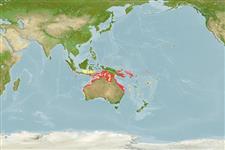Ελασμοβράγχιοι (καρχαρίες και σαλάχια) (sharks and rays) >
Carcharhiniformes (Ground sharks) >
Carcharhinidae (Requiem sharks)
Etymology: Carcharhinus: karcharos (Gr.), sharp or jagged; rhinus, an ancient name for sharks, from rhine (Gr.), rasp, both words alluding to a shark's jagged, rasp-like skin (See ETYFish); cautus: Latin for nervous or wary, the “Nervous Shark” mentioned in Whitley (1940), referring to how the “slightest splashing” in shallow water caused this shark to “dash away at great speed into deep water” (See ETYFish).
More on author: Whitley.
Environment: milieu / climate zone / depth range / distribution range
Οικολογία
Θαλασσινό(ά) Υφαλόφιλο(α); εύρος βάθους 0 - 20 m (Ref. 106604). Tropical; 5°S - 30°S
Western Pacific: southern New Guinea, Solomon Islands, and northern Australia (including Western Australia, Ref. 7300).
Length at first maturity / Μέγεθος / Βάρος / Age
Maturity: Lm 91.0, range 85 - ? cm
Max length : 150 cm TL αρσενικό/απροσδιόριστο; (Ref. 244); 150.0 cm TL (female)
Ραχιαίες άκανθες (συνολικά) : 0; Εδρικές άκανθες: 0. Grey or light brown above, white below; dorsal, caudal, and pectoral fins with black margins, expanded apically to black tips on caudal fin lobes and pectoral fins; probably a conspicuous white band on flank (Ref. 9997).
A little-known reef shark found in shallow water on the continental and insular shelves, but may range in deeper water (Ref. 244). Feeds on small fishes and crabs (Ref. 244). Viviparous (Ref. 50449). Rather skittish and timid when approached (Ref. 244). Probably harmless or minimally hazardous to people (Ref. 244). Utilized for human consumption (Ref. 9997).
Viviparous, placental (Ref. 50449). Size at birth between 35 and 39 cm (Ref. 244). Distinct pairing with embrace (Ref. 205).
Compagno, L.J.V., 1984. FAO Species Catalogue. Vol. 4. Sharks of the world. An annotated and illustrated catalogue of shark species known to date. Part 2 - Carcharhiniformes. FAO Fish. Synop. 125(4/2):251-655. Rome: FAO. (Ref. 244)
IUCN Red List Status (Ref. 130435: Version 2024-1)
Human uses
αλιεία: περιορισμένης εμπορικότητας
Εργαλεία
Special reports
Download XML
Διαδικτυακές πηγές
Estimates based on models
Preferred temperature (Ref.
123201): 24.3 - 28.6, mean 27.5 °C (based on 348 cells).
Phylogenetic diversity index (Ref.
82804): PD
50 = 0.5000 [Uniqueness, from 0.5 = low to 2.0 = high].
Bayesian length-weight: a=0.00347 (0.00194 - 0.00621), b=3.09 (2.94 - 3.24), in cm total length, based on LWR estimates for this species & Genus-body shape (Ref.
93245).
Τροφικό Επίπεδο (Ref.
69278): 4.3 ±0.3 se; based on diet studies.
Ελαστικότητα (Ref.
120179): Πολύ χαμηλό, ελάχιστος χρόνος για διπλασιασμό πληθυσμού > 14 έτη (Fec = 1).
Fishing Vulnerability (Ref.
59153): Very high vulnerability (90 of 100).
Nutrients (Ref.
124155): Calcium = 7.5 [1.5, 38.8] mg/100g; Iron = 0.403 [0.105, 1.136] mg/100g; Protein = 22.1 [19.2, 24.3] %; Omega3 = 0.126 [0.054, 0.289] g/100g; Selenium = 39.7 [10.8, 103.3] μg/100g; VitaminA = 58.3 [23.7, 151.7] μg/100g; Zinc = 0.556 [0.267, 1.076] mg/100g (wet weight);
